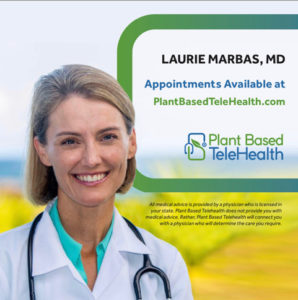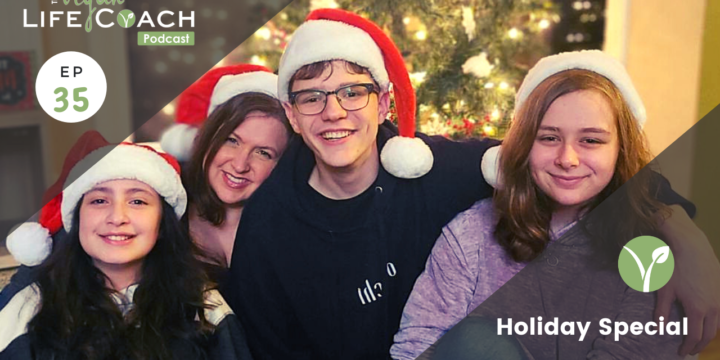Throughout my conversation with Dr. Elsa Spencer, we bounced from how she became a vegan and her activism, to how she overcame childhood trauma and an eating disorder, to her favorite healthy brownie recipe.
LISTEN/WATCH
Subscribe: Apple Podcast | Stitcher | Spotify | YouTube
*Links mentioned in the episode are at the bottom of this page.
It isn’t often that I get a chance to talk with someone who’s been vegan for longer than I have. Elsa’s expertise and authenticity is refreshing, and much of her story will resonate with our listeners (as it did for me) in powerful ways! Elsa reminds us of just how challenging life can be, and the beauty that can bloom from facing adversity.
Dr. Elsa Spencer, Nutritionist, Professor, Biologist (and So Much More!)
Dr. Elsa Spencer earned her Ph.D. in nutrition in 2003. She trained as a researcher and teacher in various topics from cell biology to food chemistry and clinical trials throughout her education. Elsa understands what food can do at a molecular level, and she can break the information into bite-sized pieces.
Throughout her career, Elsa has performed nutritional research, written papers on nutrition, gotten these papers published in medical journals, coached individuals in plant-based nutrition, and teaches at her local community college. She continues her passion for nutrition by coordinating food for a local plant-based children’s camp during the summer months.
One item that is critical to Elsa is making sure she gives back to the vegan community. She owes (and discusses in our podcast) her copious physical and mental energy to living her last 28 years as a vegan. She volunteers for the Vegetarian Resource Group, is a former intern for the Physicians Committee for Responsible Medicine, and is a regular contributor at Anonymous for the Voiceless Actions.
When she’s not running around spreading the word about good nutrition, she can be found bicycling to work, challenging herself with yoga, and running (or walking) around Charlottesville, VA.
The Discussion of Veganism
Elsa’s vegan story started about 28 years ago. During her freshman year of college, Elsa began toying around with the idea that she wanted to become vegan. While already a vegetarian, she and her high school friends decided that they wanted to do something about the environment and know more about animal cruelty. They believed they would be able to slow carbon emissions by omitting meat products from their daily diet. She realized that carbon emissions were still being released not only from cows killed for meat but also from dairy cows. It was the light bulb moment that turned her vegan.
As with every first-year student (Elsa kindly points out), the first year of college can be quite jarring. She had moved out of her home at 17, started going to college, lost her first serious boyfriend, and met her father for the first time.
On top of those life-changing events, Elsa started to remember events from her childhood. Her eighteen-year-old brain decided that she was finally ready to old enough to remember the incidences of sexual abuse that had occurred when she was a child.
Feeling out of control, Elsa turned to food as something she had the power to control, which led to anorexia.
As she began to come to terms with everything, Elsa sought out a therapist who helped her through her eating disorder. The therapist also helped her realize she might have underlying OCD.
Even now, at 46, Elsa still sees a therapist to help her work through her thoughts and emotions. While her eating disorder is well under control, she admits to it taking over a decade to get it truly sorted out.
Life after College but Still a Full-Time Vegan
Elsa described how excited her in-laws were when they came to her with a quiche they made, incorrectly thinking it was vegan-friendly. She was touched that they tried, and when she asked what was in the meal, they responded, “no cheese, broccoli, and eggs . . . “ They had removed the dairy component but forgot about (or were unaware) that the eggs were not vegan.
While she never compromised her veganism, even to appease her in-laws, Elsa saw that others around her did. She felt driven to spread awareness to everyone who wanted it, and this is where her spunk for activism stems from.
She wants to make sure that everyone who wants information about veganism and plant-exclusive nutrition can find it easily.
Three-Question Speed-Round (in Elsa’s words)
If you were a non-human animal, what kind of animal would you be?
I go back and forth between a dolphin and a bird, but right now, I’m a bird. I love flying dreams. I’ve had very lucid dreams since I was about 12 years old. I could always just tell myself I’m going to fly, and I’d be flying, and then, of course, I’d wake up and realize that I couldn’t fly and I was so disappointed.
But, it would be a bird, like a big soaring bird—like an eagle or a falcon or a hawk.
If you could choose a time or place that you could be reincarnated, what year and location would you choose?
I have to say that I don’t know if I would ever go back in time. I was born still-born. My heart stopped when I was inside of my mother, and I was born blue and unmovable. While the doctors and nurses did give me CPR and extra oxygen, they told my mom that I would never walk, talk, and probably be quadriplegic because of the experience.
I didn’t end up talking until I was three. However, I saved up all my words and built sentences, and I’ve barely stopped using them since.
I’m very grateful for the life that I do have. Living in the century I do live in, in the Western world as a woman. I don’t know that I would have internalized all the classically-American values, but I would possibly choose France or Denmark (a properly socialist country).
What is your favorite Dark Leafy Green? Your favorite nut? Bean? Sweet treats you can make or buy . . .
Kale, pistachios, chickpeas, brownies (black bean, no salt, oil, or sugar, but used with date paste). You could do so many great things with them; you can add stuff (like nuts or dried fruits, or add peanut butter to the top).
MENTIONED IN THIS EPISODE
CONNECT WITH US!
Take Our New Going Vegan Quiz HERE!
Grab the valuable gift we have for you HERE.
Have a question you’d like us to answer, or feedback you’d like to give us (we love hearing from you!)? Leave us a voice (or written) message HERE.
Interested in receiving a free coaching session to air on an upcoming episode? Apply HERE.











